6th October 2022
The Spokesmen Cycling Podcast
EPISODE 308: In conversation with Legion’s Justin Williams
SPONSOR: Tern Bicycles
HOST: Carlton Reid
GUEST: Justin Williams
TOPICS: On today’s show, six days into Black History Month, Carlton talks about the inspirational 19th century black American professional cycle racer Major Taylor with his modern equivalent, Justin Williams. Like Major Taylor, Justin raced in Europe but unlike Major Taylor he’s entreuprenial, using his Los-Angeles-based Legion racing team, which he founded with his equally fast brother Cory, to increase the diversity of cycling. In this 45-minute chat they talk about Justin’s cycling mad dad and the crazy popular cycling scene of Belize.
LINKS:
https://www.instagram.com/juswilliamz/?hl=en
https://www.instagram.com/l39ion.la/
https://en.wikipedia.org/wiki/Major_Taylor
http://majortaylorassociation.org
https://www.instagram.com/nationsnumber1beast/
https://www.rapha.cc/gb/en/stories/legion-of-los-angeles
https://www.instagram.com/ayesuppose/?hl=en
https://en.wikipedia.org/wiki/Red_Hook_Crit
TRANSCRIPT
Carlton Reid 0:13
Welcome to Episode 308 of the Spokesmen cycling podcast. This show was engineered on Thursday sixth of October 2022.
David Bernstein 0:27
The Spokesmen cycling roundtable podcast is brought to you by Tern bicycles. The good people at Tern are committed to building bikes that are useful enough to ride every day, and dependable enough to carry the people you love. In other words, they make the kind of bikes that they want to ride. Tern has e bikes for every type of rider. Whether you’re commuting, taking your kids to school, or even caring another adult, visit www.tern bicycles.com. That’s t e r n bicycles.com to learn more..
Carlton Reid 1:02
On today’s show, six days into Black History Month, I talk about the inspirational 19th century Black American professional cycle racer Major Taylor with his modern equivalent, Justin Williams. Like major Taylor, Justin raced in Europe, but unlike Major Taylor, he’s entrepreneurial using his Los-Angeles-based Legion racing team, which he founded with his equally fast brother Cort to increase the diversity of cycling. I’m Carlton Reid, and also in this 45 minute chat, we talk about Justin’s cycling mad dad and the crazy popular cycling scene of Belize. Oh, and there’s a short bonus video clip of Justin on the-spokesmen.com because he set up his camera for this chat, even though I didn’t. Okay, first of all, thank you ever so much for for coming on the show and we’re being completely different time zones here so you are 9am Justin, is that right?
Justin Williams 2:12
Yeah 9am
Carlton Reid 2:13
Okay, is that early for you? Is that good or bad?
Justin Williams 2:17
That’s usually right time for me. So I’m typically I typically have breakfast I’m out the door. I’ll try to get out the door at nine. I live in the valley so it gets a little bit hot especially and winding down end of summer so still we still have some pretty intense days
Carlton Reid 2:33
when you think getting out the door that’s for training or that what is that?
Justin Williams 2:36
Yeah, yeah, that’s for training. That’s that’s usually that’s usually right time.
Carlton Reid 2:40
Yeah, that kind of makes sense – for here where we are it’s raining all the time. So that wouldn’t apply. You kind of go out in the rain showers in England, Northern England even worse than just being
Justin Williams 2:54
Yeah, that’s that’s rough man. I was in London maybe three weeks ago and it was amazing.
Carlton Reid 2:59
Well, talking about London and talking about the UK you’ve got the Legion kit is done by Rapha. So that’s that’s a London a UK a British brand had that deal, because it looks fabulous y the way, how did that deal with Raphaa come about?
Justin Williams 3:12
Now that’s a great question. The deal with Raphaa came about because I have a friend named Mark Alfred, who works for them. He’s the Marketing Manager for the Santa Monica store. And I went to a premiere with Gus and Morton’s we’re about there abouts. And we had this conversation after after, after the premiere had happened and I had talked to Mark and I said, Hey, man, like, I love this is really dope. And he had been trying to corner me because I was riding another brand. He was like, dude, you gotta come to Rapha. You know, the way we market things, the way we tell stories. It’s really in line with kind of what you’re trying to do and how you’re trying to tell stories. And me and him just chat. It was a couple other really cool people that I had loved from the brand and had good relationships with so I really considered it but really, you know, my friend Mark and an understanding of how Rapha operates and functions as a storytelling brand really, is what drove me to go go in that direction. Obviously, the clothing the clothing is amazing. And so that was a factor also. But the big factor was like the storytelling that the brand
Carlton Reid 4:32
Because that they’re obviously known for having very expensive, very slick, very, very nice kit. But yet that storytelling, you had mentioned that because they are doing an awful lot more for diversity in cycling, which is what you’re you’re absolutely about too?
Justin Williams 4:45
Right. And so the mission is aligned there, right. They wanted to they wanted to give more into that. And that’s obviously like most of what we’re trying to accomplish is creating diversity and inclusion within the space and giving people an opportunity to be the most authentic version of themselves. And so that alignment was very important. And they gave us that platform to tell that story on a bigger level.
Carlton Reid 5:11
Now my son, who is currently he did the Transcontinental race across Europe just recently, he’s riding back from that. And he rang just before we came on to record this. And I said, look, I gotta go, son, because I’m going to be interviewing you. And he said, he’s really cool. And I said, why? Why is Justin really cool? And then he gave me your life story. So clearly, I did not prime him on this. I did not say, you know, he just knew everything about you told me all the podcasts he’s listened to where you’ve been on, hopefully and he’ll listen to this one. And he knows about your, your brother and your background, all that kind of stuff. And then he made this really interesting point. And if this makes a Forbes story, then this kind of comes to the fore here in that he said — do you know that a guy called Mark Beaumont, have you heard of that guy? No, he’s a he’s a long distance cyclist. He is the guy who’s ridden around the world the fastest in a number of different ways. He’s that kind of guy. But my son said, Justin is like Mark Beaumont because they’re both business minded. So Mark has kind of like made a business out of his his prowess in in cycling, and you are also very, you know, founding or co founding a team. It’s that kind of ethos, as well. So tell me about your business acumen. And how it developed.
Justin Williams 6:42
Yeah, honestly, it’s come, it’s come very natural. To me, I have such an entrepreneurial mindset. And that’s something that’s always been just a part of who I am, I’ve always thought about how things work and why people buy things and what connects people to products and why I love Nike, and not you know, any other brand. And so that was always fascinating to me, I think it started with kind of like this fascination with marketing. And then, and then the stubbornness to want to do things my own way. I’m very much of the mindset that just because people have done it one way doesn’t mean that it doesn’t, it can’t be done another way. And I think that finding your why, and the truth of what drives you and then getting people on board to help you with that vision is something that’s very important to, to that understanding of, of having, but to my understanding of having a successful business. So yeah, I think it started in marketing, and then everything else is just learning and knowledge. I’m just really thirsty for learning and understanding of how things work in business. I love kind of the game that’s played with, you know, everything from you know, pitching to, you know, negotiations and, and trying to get the best outcome for for kind of whatever your goals are. So that that’s, that’s always been something that in being an athlete, I love riding my bike, I love travelling, that’s still a big love and passion of mine. But as I look to my future, it’s definitely something that I’m very, very interested in. So I figured why not get started a bit early and start taking the steps toward and learning kind of the different ways businesses run, how CEOs operate, looking at some really successful businesses, looking at some businesses that have failed, and kind of like really picking apart and understanding like why those things happen. So yeah,
Carlton Reid 8:55
You’re a bit old for me to nominate you for the Forbes 30 under 30.
Justin Williams 9:00
That was a dream of mine. That was honestly when I was growing up. It was it was definitely I missed it. I’m 33 now I missed it but that was definitely on my list of things to do, with 30 under 30.
Carlton Reid 9:13
Well, I couldn’t nominate you because you’re American anyway, because I’ve got to nominate European guys I did nominate a cycling entrepreneur to become one of the 30 under 30 and thankfully he actually he got that so he was super pleased with that they they kind of said they take pro clothing from from all the pro teams and then sell it to everybody else you know once the pros have used it. Let’s go back to your your pro kit and your Rapha kit. And and and and the graphics that you’ve unpacked your T shirt that you’re wearing there now, so the Legion logo has the 39 in it. So I’ve read where the 39 has come from I’ve listened to the fact that but for the for the sake of everybody who hasn’t heard of that This is a street. Obviously, we’re in Los Angeles, but it’s almost kind of like a district and it’s an area and neighbourhood. So tell me about that neighbourhood and why 39
Justin Williams 10:12
Yeah, it’s, it’s in South Central, actually, it’s 39th Street is in South Central LA. And it’s such a great contrast because USC is literally maybe a mile away from where I grew up. And I didn’t grow up in the most fancy of neighbourhoods, it was it was unpredictable, and it was rough. And it was you had to be really cautious. And my parents did a really good job of keeping us away from a lot of things without taking away like quality of life. And, yeah, the area’s just you know, it’s, there’s movies about it, there’s, it’s, it’s, it is very much or was very much I think that it’s, it’s getting a bit better now, it was very much kind of like, the Wild West, like, I’ve called the police before, and like no one showed up. Like, that’s the kind of area it was. And with, even with having all of that it’s such a great place. And it was such a great place. For me growing up, my family was all very close to me, we splay we had this really cool space, that was an alley that they have, like, blocked off at both ends. And then the wasn’t there was only one side of the alley was gated, the other side had led to our apartment. And so we had this like, it was probably like, a 50 metre alley, and we used to play football and basketball and, and that’s where I really fell in love with sports was in that alley, just playing sports every day, man every day with like, I have a lot of cousins with all of my cousins, like there’s, you know, upwards of like, 10 of us at a time playing sports in. And that’s where I learned to be really tough because my cousins were very, if you cry, you don’t play. Growing up in that environment where we had that little bit of protection of that ally and a hat and I didn’t have to go make friends because I had my whole family. It was it was you know, that was the that was a the blessing of it. You know,
Carlton Reid 12:13
And your dad kind of gave you a very similar experience I’ve read of putting you on a long bike ride when you’re 13. And then kind of leaving that ride.
Justin Williams 12:25
Trial by fire. I like long story. Here’s the long version of it. My dad bought me this Bianchi, it was this Celeste and orange Bianchi and it had Shimano on it. And I remember like it was yesterday. And I was riding his bike around, it was my size. And I was really young. I think it was maybe 10, 9 or 10. And I’m riding it around this alley. And it’s long I can ride it. It’s like a full effort, dude. And I remember my mom making me let my younger brother CJ ride the bike. And then my dad comes out Oh, my dad’s working in this like little corner because he’s fixed cars. But like he still fixes cars, but you still like fixed cars, and then like so on. And he stops working. And he looks out and I’m not riding the bike that he got me and this is like a serious thing because it’s like a foreign race bike. And he goes and he takes it away. And he goes, you’re not serious. Like you’re done. Like you’re not serious. You don’t want to do this, like the bike is a serious thing. It’s really hard. And so I like never, he never bought me that bike. And then so it took me like another two or three years to like, convince him and I convinced him by riding his trainer, he had his trainer already had his bike on the trainer. And one day I just like randomly started riding it. It was winter, and I wasn’t doing anything I was playing football wasn’t played basketball. I don’t know if it was raining outside. Maybe it was wet outside, but there’s no reason to be outside. But I had so much energy as a kid, I needed to do something. And and so I started riding his bike and my dad at this point is probably like five inches taller than me. So like it doesn’t fit. And he comes inside, he looks at me and I expect that I’m getting screamed at like I’m about to go toe the toe to read a book or do anything else. Like it was very known that you don’t touch my dad my father’s bike. And he just looks at me and he pauses and then he goes into the kitchen, he gets whatever he wants. And then he leaves and I think I ride the bike for like 30 minutes that day. And then I ride the next day. And then the day after that he like puts the seat down. And then the day after that he like makes the cockpit a bit shorter. And then he’s like, okay, and then slowly but surely, he gets me all of these new things. He got me like shoes and like the pedals to work with the bike. And before I knew it, I was riding this bike. It was way too big for me when I was riding and I had to ride it for a month before he would even consider taking me outside. So then or sorry, two months, so then two months go by. He’s like alright, great. We’re gonna go for we’re gonna go for a ride. And so we’re riding and I haven’t done any I have this before, I don’t know how much I need to drink. I don’t know how much I need to eat. I don’t even know that I need to eat. I’m thinking we’re stopping at McDonald’s or something. And we’re doing this right. And we just keep getting further and further and further and I kid you not like, at the point where we turned around, I was done. Like, I was done and and we had to turn around and I was like, oh my god, we’re going home. And at this point, I’m like, starting to bonk, which is, you know, when your body doesn’t have enough sugar in it to function properly. And yeah, and I’m just like struggling through this, right? And he’s like, pushing me up some of the climbs and I can tell he’s getting irritated with me. And we’re doing sting. And we get to this point, that’s right. At the beginning of Malibu, it’s like, we’re Malibu. It’s like when Malibu starts and when Santa Monica starts. And I’m just done. I’m like cramping, and I’m just, I’m ready to go. I don’t want to be here. I don’t want to do it anymore. I’m done with the sport at this point, and he’s just like, trying to massage this cramp out of my leg. And I have shorts. I have box I was uncomfortable with the warning just the tight so I have boxers under under my like cycling shorts. And he’s like, I literally he’s like I told you not to wait, you don’t wear short cycling shorts under your you don’t wear boxers under your cycling shorts. What are you doing? And I was like, at this point, dude, I don’t care. I mean, just like, do your worst that. You just like, stay here. And I’m just on on Santa Monica. He’s just like, stay here. And I’m like, alright, cool. And I think he’s going to get help. And he’s gonna come back. And turns out he was just he was going to catch up with the ride that we were the group that we were what they were riding with. And, and I’m just sitting there for maybe five or 10 minutes. And I’m just, I’m a kid. I know better, right? Because I had gone. I’ve gone places I hadn’t known better. I just stayed there. And like 10 minutes later, my aunt pulls up and picks me up. And he was just gone. I didn’t see him until he got back until I got back to the house. So that was my introduction to cycling.
Carlton Reid 17:11
That’s a helluva introduction, surprised you ever got on a bike again.
Justin Williams 17:16
yeah, no, it was uh, at least the weather was nice. And my aunt took me to get food like immediately. So it was like it ended up being a really cool day. She’s one of my favourite aunts. So we got to hang out. And she was basically like a sag vehicle. So she’s basically just following us. Which I didn’t know, because I was so busy trying to like stay with the ride, right? And so hyper focused on trying to stay with the ride. But yeah, it was it was quite the introduction.
Carlton Reid 17:40
So my son overtook me as a fit cyclist at about the age of 15. So how long did it take before you know that that that incredible. And you described there? How long before you beat your dad anyway?
Justin Williams 17:55
Oh, that’s a great question. I was so lucky. So my dad raced the category threes when I was growing up, and he would do some one, two races. But for the most part, he just was very comfortable in threes in California when I was growing up the category threes are like the everyday man’s group. So it’s like very, it was super, super competitive. It had a lot of debt to it. But it was for the people that didn’t have the time to put in, you know, 25 or 30 hours of training, but they had the experience of being very good bike racers. And so when I was about, I would say 15. I started racing with my dad every once in a while. And that was really cool. And then when I was 16, I spent the whole season like having my dad as a lead out man. And I think I won like almost every big race in in California at that point. And it was really cool. I was second in the state championship which broke, which which broke my heart but but I had won some of the biggest races in California. My dad was my lead out guy. And so I think at the end of 16 is when I started. I think we’re pretty equal at the end of 16. But I think 17 is definitely when I was I was better I could like take him out on a ride and like smack him.
Carlton Reid 19:08
And does he still ride?
Justin Williams 19:10
Yeah, he rides every once in a while. I tried to shame him into riding because he has such a nice equipment now.
Carlton Reid 19:16
Because you has your handdowns? ,
Justin Williams 19:19
exactly. I’m like no one has a Legion bike and you have a Legion bike.
Carlton Reid 19:22
I get my son’s handdowns so he’s a Giant sponsored athlete. I get his — it used to be he used to get my bikes, now I get his hand me downs.
Justin Williams 19:32
I used to get my dad’s part I didn’t get a new bike. I didn’t get anything new until I turned pro. So I turned pro when I was 17. And my dad always gave me either his hand me downs or my uncle’s would have hand me downs or like Hassan would have hand me downs. Like those. We had a really, really incredible community. In LA actually of black cyclists Steve Pulliam this guy Orlando there’s there’s a there was a major motion named after Major Taylor, a cycling club. And it was this really amazing group of people. So like, there’s so many people that either gave me their old stuff on top of my dad gave me his old stuff, but it was. And I look back at that now and think it’s incredible that like, as a kid, I was so excited to get anything that was, you know, a higher quality of what I had, it didn’t matter if it was hand me down or not. And then it made it so much more special when I got my first fully pro, new bike
Carlton Reid 20:33
As a black athlete, aspiring cyclist when would you first hear about Major Taylor? Is it he’s somebody that, you know, does he transcend cycling as a black man? Or is that something you had to be a cyclist to have heard of him?
Justin Williams 20:48
No, I think that that moment is coming. I think that moment is coming. I think that there’s places where he transcends cycling, but I don’t think enough people know how incredible his story was. So you know, he’s a first American World Champion, I believe,
Carlton Reid 21:02
But he suffered an awful lot of racism when he was racing in Europe, a tonne of racism,
Justin Williams 21:08
again, an incredible amount, an incredible amount he like had to race a lot of races from the front just because of sabotage from other riders, because they just didn’t want to see him win, which, which is, which is funny and ironic.
Carlton Reid 21:22
He also made a lot of money.
Justin Williams 21:23
He, he also made an incredible amount of money. But like what happens with athletes, especially nowadays, he didn’t know how to invest it, or he didn’t know how to make it work for him. And so he I think he ended up dying with nothing.
Carlton Reid 21:37
Yeah, that’s a kind of common story. So let’s, let’s go back back to LA and Cycle Kids. So quite apart from you know, Legion, you know, with with, you know, that kind of level of cycling, you’re also trying to reach kids who you know, your seven year old, your 10 year old. So tell me a bit about Cycle Kids.
Justin Williams 21:57
Cycle Kids is amazing. It’s an amazing organisation. And it just gives us a platform, a platform to create, to start this process of pipeline, right. The thing about cycling that isn’t the same about other sports is that in America, in particular, there is no pathway to get from being a kid to the pros. And so something that we’re focusing on and partnering with someone like cycle kids is, let’s get bikes in schools as early as possible. Let’s get kids learning about bikes and having an understanding of about about bikes as early as possible. And then use that to them, like enriching the junior ranks, and then the collegiate ranks. And then you know, after that the category, that you have the categories that you have to climb on your way to pro. So we just have such a great relationship with them. It’s so fun just getting to interact and communicate with kids and stick them out on bikes. Everyone learns, mostly everybody learns how to ride a bike when they’re a kid. And somewhere along the line, they forget that journey. But that is step one, right? It’s getting kids a richer understanding of, of how bikes work. So in case, you know, you get a flat or something’s wrong with your bike, and your parents can’t fix it, it doesn’t get like parked in the garage, you they can go after it. And there’s a curriculum that’s like kids provides a school that they can get after and they can learn how to ride their bikes. It’s a really, really cool programme. And we’re really proud to be involved with them. Because it is like, like I said, it is step one, where we get to interact with these kids at a at a level where they’re just starting to understand things. And so teaching them how to work on a bike has been really cool. We’ve had a couple of stops already where we get to be Santa Claus, I say, we get to go and then and they do all the hard work. And we get to come in and just build the bikes with the kids and kind of answer any of their questions and get them stoked on everything from like how fast we go to all the junk food we get to eat on the road, which is a massive hit with kids. And yeah, and then just you know, teach them teach some of them how to ride a bike, some of them don’t know how to ride a bike and it’s funny watching my whole team run after these like tiny little kids as they try to like balance on this brand new bike. So that’s really fulfilling and very much in line with again, creating a pipeline to the top of the sport which is Legion.
Carlton Reid 24:24
You Ciclovias in LA but exactly have you noticed a difference in the that years you’ve been riding? Have you noticed a difference in cycling in in Los Angeles and hopefully you’re gonna say it’s getting better? Or is it
Justin Williams 24:42
almost hard around the world? Honestly, the difference that there’s been in like diversity in LA like, I was lucky enough to grow up in a we used to do a ride out of the Merc Park, which is like a very like central place for black culture and I like it And so I was lucky to see that at home. Now when I went to like different places like, you know, the valley, Orange County, yeah, there was there wasn’t a tonne of diversity and a lot of black people were racing at that point. But we had some, but when I travelled around the country, there was no black people. Like it was no, there was no people, barely any people of colour. And now that we travel, I kid you not, it is amazing to watch it be like a almost a 5050 split of like, you know, Asian people and black people and Spanish people and, and it’s incredible to watch this all happen in kind of in my time, I’d say. And then even around the world, when I, I did a project, it was like a panel in London last year at Rapha. And it was to celebrate a lot of talent and Black talent in cycling. And I’ll never forget how proud I was to see this room full of people of colour in London. And up until that point, I hadn’t realised a lot of the things that were happening, because I was so focused on building the team trying to change a sport, you know, redefining, like the relationship that like the general public has with cycling, I was trying to do all these things. And I was so focused in like, in a tunnel, that I didn’t notice it. And that really took me aback when I got into that room and heard the applause of all these people of colour that felt like they had something that they could be a part of, and connect to. That was probably one of my proudest moments thus far, in doing what we’re trying to accomplish.
Carlton Reid 26:46
You kind of I’ve read that you’ve one of your heroes back in the day, he’s not that much older than you anyway. But it was was was Rahsaan Bahati of the Rock Racing team. And cool, very cool strips they had the, the jerseys they had,
Justin Williams 27:08
I was lucky enough to be a part of that team. Rahsaan actually brought me on
Carlton Reid 27:12
So so he’s another famous black rider, then you’ve got Ayesha McGowan, who’s been on on this show a few times, starting in 2016, she’s she started getting much more visibility, you know, back then, as well as the only at that time the only black road cyclist in you know, getting sponsored and stuff. So are you definitely seeing a change, you know, these people that were just mentioned that, you know, including yourself are, are making a change. But do you see that carrying forward?
Justin Williams 27:45
Yeah, no, I think that as obviously, as we get more opportunity, we give more opportunity. And obviously, because we understand the landscape and kind of how some of these teams function and operates, we know that there’s people that deserve chances that aren’t getting them. And so I even last this year, this year at Tulsa tough, which is one of the biggest criterium series in the country. We took a picture with the Caribbean riders that were at the race because me and my brother race for Belize now. And there was like 10 of us. And before I remember there being like Amile Abraham, which was like one guy from Trinidad, like that was that was it. And it was like 10 of us it was like Bermuda and Barbados and Trinidad and Belize. And it was, it was incredible. That was so so so cool. To kind of see that change happening. And then obviously with everything that we’re trying to build, the more of those opportunities that we can give out to bring some of these talented athletes.
Carlton Reid 28:49
What’s cycling when your parents were in Belize? And is that how your dad was into cycling back then was the cycling culture in Belize?
Justin Williams 28:56
Oh my God, that’s like a big story cycle cycling in Belize is like cycling in Colombia, like the country loves loves loves cycling. We do a race every year. It’s called the Holy Saturday cross country race. And the whole when I say the whole country is on the side of the road cheering for this race. I mean like there’s 1000s and 1000s of people lining the road it’s an out and back so you get to see the race twice. And it’s like it is a national holiday. But like this This race is so important to the country that if it Belizian wins then everyone goes out and they celebrate for the rest of the week and it’s amazing and if a Belizian doesn’t win, it gets a foreign winner it’s it’s painful. It’s like everyone’s like talking about feeling disappointment come off from people. It’s a really big deal. So I think in Belize, soccer, cycling and track and field are like the sports but cycling is a really special one.
So your Belizian heritage has been important in and getting into you into cycling?
Oh, incredibly important. I remember being a kid and go into my uncle’s barber shop, and having these massive trophies. They’re like the same height as me at the time. And I remember these trophies and they’re all dusty and old. And I was like, why does this guy still have these like trophies? Like they look like they’re falling apart. And he had won this this race cross country. And so even for as long as I can remember, I didn’t know what it meant. But those trophies in that race was like so present in my life. And now I have a bunch of those massive trophies. Oh, my my mom has them, she doesn’t let me touch them.
Carlton Reid 30:44
So from Belize to Belgium, tell us about your time, your time in Europe.
Justin Williams 30:50
Yeah, my time in Europe, like when it was it was an exciting thing. I was on the US track national team when I was 17, 18. And a part of the programme was going over and racing road in Belgium to get ready for them, like the Mad at the six day season, the Madison season. And it was the best thing for me because the it was hard. I was a sprinter or I wanted to be a classics guy. And I was a sprinter. And I was really fast. And there was no real development in the US for that I didn’t even get a coach until I was 20. So I didn’t really know exactly what I was doing or exactly how to channel my energy and my training to get the best outcome. And then, like I said, the only thing I had was were Rahsaan as I had Rahsaan as a mentor on how to sprint but not in the systems or the direction that was going to take to get to being a sprinter on the highest level. And so when I got over to Belgium, cut, it was like so much change, you know, I had literally gone from, you know, not doing I don’t think I was doing anything the year before, because the team that I was on had folded halfway through the year. And so I was doing these races and I was getting, I was getting good results. I was doing this. And it was I definitely could see myself doing the racing, but I just wasn’t mature enough yet. And I didn’t have the kind of support and there was there was a few key things missing or what you will need to survive over in Europe didn’t speak the language didn’t understand how to function as an adult in the space where you’re on your own. And so ultimately is as cool as the experience was because my whole thing was I got to do under to be under 23 Paris Roubaix. And that was like the only thing that kept me going. And once I did that I was pretty much done because after that was gone, everything that I that was my Northstar. And then when I came home after that, everything that I had dealt with over there had really been prominent in the front of my brain. And I just it just wasn’t for me. It just wasn’t for me, I didn’t feel like I belonged. I didn’t feel like I had the support, I needed to be there. I definitely didn’t have the money to be there. I was constantly running out of money. So it just it was just too much for a kid at that point to be over in another country coming from South Central LA and trying to like become all of these things with all of these handicaps. And yeah, I just decided that the like the juice wasn’t worth the squeeze, like what it was going to take for me to be over there. I was like no, I would rather be home and you know, I love criterium racing I would rather like try to make a life out of that. And at that point, like were Rahsaan was making decent money. So I figured like, Okay, well I can be I can be a criterium sprinter and like that’s, that’s good enough for me. So that was that was kind of my experience over there. But I go back now and it’s I still think it’s pretty incredible. I’ve been lucky enough to go to Worlds in Harrogate and then the worlds in Belgium. And those were both, like some of the coolest experiences I’ve ever had.
Carlton Reid 34:10
So you’re sprinter, you’re a crit rider. Do you? Are you like an all-bike guy as well? So you’ve got a mountain bike, you ride fixies What are you just a complete bike guy or you really on your your your track bike only?
Justin Williams 34:24
No, I’m an everything guy. Everything except for gravel. Except for except for gravel. I just I just don’t get it. But mountain bike, mountain biking. I love a good mountain bike ride. My problem with mountain biking is that I keep going out riding with my pro mountain bike friends, and they think that I’m as good as I am in criterium racing and mountain biking and I’m just not like I love mountain biking but again, I think it’s so fun but I’m not trying to follow like my pro mountain bikers like I’m not trying to ride down descents with like Lance Lance Heydrich or Christopher Blevins like I don’t want to do that to myself. But I do really love and enjoy it. Road bike always track bike love the track. It’s my it’s a secret weapon like if you want to build speed get on a track it makes you incredibly fast. Yeah, like BMX like oh hang out and riding BMX every once a while I’m not gonna do any jumping, but it feels like being a kid isn’t the style J and riding a BMX bike.
Carlton Reid 35:27
Fixie?
Justin Williams 35:29
Love fixie
Carlton Reid 35:31
Not a track bike as in like an urban fixie?
Justin Williams 35:34
Yeah, I’ll do fixie, I’ll do fixie, I was actually a part of I got to, you know, I was lucky enough to be a part of Red Hook, when that was kind of this big deal. And honestly, you want to talk about this crazy influx of culture and people from every walk of life being a part of this like really tight knit group Red Hook was this incredible space where everything that cycling needs to be Red Hook was and that’s that’s fixed cure races. I was second in 2018. And in the red, the Harlem or not the Harlem Red Hook, New York race, which was really cool. And then before that had gone to Barcelona on vacation, like my vacation from cycling was a cycling event. And it was it was a Red Hook Barcelona. So I do a little bit everything like even cyclo cross, I love in cyclocross and gravel to me are different
Carlton Reid 36:33
You’re cyclo cross is usty cyclocross.
Justin Williams 36:37
we’ve know Yeah, we know, our cyclocross is like a crit on dirt. Yeah. Which is awesome.
Carlton Reid 36:43
To us. Yeah.
Justin Williams 36:44
Exactly. It’s a crit on dirt. But it’s dope because it’s like, you have the display your understanding and like skill in handling of the bike, and what’s going to happen and it’s it’s so fun watching people kind of flail on on gravel. Like it’s so many people are going to gravel because they’re like, oh, it’s safer than road riding. And I’m like, Yeah, but have you been down like a, like a super dirty, dusty descent before like the ground moves under you on gravel. The ground has moved on to you on the road. But yeah, that’s how it is.
Carlton Reid 37:18
At this point Justin I’d like to quit for an ad break, and my colleague David will take over.
David Bernstein 37:24
Hey everyone, this is David from the Fred cast and the spokesmen and I’m here once again, to tell you about our amazing sponsor Tern Bicycles at www.ternbicycles.com t e r n bicycles.com Tern are committed to building bikes that are useful enough to ride every day and dependable enough to carry the people you love. Speaking of being able to ride every day as a spokesmen listener, I’m going to bet that you are the go-to consultant for your friends who want to ride but are an enthusiast and need some advice on what to buy. In that case, you may have people in your life for whom you just haven’t been able to recommend just the right bike considering their stature, age mobility issues or just plain hesitant to get back on a bike. Finally, those family members and friends can experience a new bike day with the all new Turn NBD new bike day Nbd. Okay, the NBDd has been specifically designed to be confidently easy to handle and easy to ride even. Even for those folks who might be as Josh Hon, team captain of Tern Bicycle says are smaller in size and have a hard time finding a bike that fits or older riders who might not have ridden a bike in a while or riders who might have balance or physical issues or riders who are just intimidated by the sheer size and weight of the average ebike. As Josh goes on to say the NBD will be refreshingly easy to hop aboard and ride. Now how can Josh be so confident in that? Well, it’s simple. The NBD has the lowest longest step through opening of any premium ebike. So if you know someone with a knee or a hip injury or or somebody who just can’t lift their leg over the top tube of a regular bike, this alone could make all the difference plus the NBD is designed with an ultra low centre of gravity and a longer wheelbase. And what does that mean? Well, it means that it makes it easy to balance and handle. And with a lowered bottom bracket and motor the NBD is stable for all riders and particularly inspires confidence for shorter cyclists because they can easily get their feet on the ground when they come to a stop. But the NBD isn’t just for shorter riders. As a matter of fact, it adjusts in seconds. Without tools by the way to fit riders from four foot 10 to six foot three or 147 to 190 centimetres. The NBD is also super comfortable with its upright riding position, swept handlebar suspension seatpost and wide 20 inch balloon tires need to load the NBD into a car. No problem, it folds flat in seconds. How about getting into it into a smaller living space? No sweat. The NBD includes Tern’s vertical parking features, you can roll the bike into a small elevator and park it in a corner of your apartment. Now with a max gross vehicle weight of 140 kilos that’s 308 pounds, the NBD can easily carry an extra passenger and plenty of cargo with up to 27 kilos on the rear rack and up to 20 kilos on the front rack. And in fact, it works with a wide range of Tern accessories and with most child seats, as I’ve said before, and this is important to me really important safety is a core value at turn. And that’s why the NBD frame and fork have been rigorously tested by one of Europe’s leading bike test labs. That’s also why turn chooses to use the Bosch motor and battery system. It’s one of the few systems on the market that meets and passes the UL standard for battery and electronics safety read the news and you know how important that is. Now the NBD comes in two models with prices starting at $3,899 or 3999 euros and bikes are going to start arriving in stores in Q1 of 2023. For more information about the NBD or any of Turn’s wide range of bikes, just head on over to ternbicycles.com Again, t e r n bicycles.com. We thank Tern for their sponsorship of the spokesmen podcast and we thank you for your support of Tern. Once again, thanks for allowing me this brief introduction everybody. And now let’s get back to Carlton and the spokesmen.
Carlton Reid 42:00
Thanks, David. We are back with Justin Williams. And we’ve been talking about his Belizian background. We’re talking about now Black History Month we’ve been talking about Major Taylor. One question we have kind of skirted around, we’ve we’ve looked at it a little bit, but I would like to like just dig into it. So you’ve got you’ve got riders, riders like Kevin Reza, who’s been in the Tour de France. But you know, we really have got, you know, the digits of one hand can very easily accommodate the number of black riders have been in the Tour de France. So do you think we’re going to get more black riders coming in the Tour de France in the next 5, 10 years? And this is like African riders? Or do you think we’re going to see black American guys coming through? What’s where do you see it coming from in the future?
Justin Williams 42:48
Honestly, I don’t care where it comes from, as long as it comes. Honestly, I think that there’s talented or I think there’s talented writers everywhere. There’s a there’s a load of Caribbean talented, right, it’s I think it’s more about building a system in which they can like start that development process a bit earlier, in racing in Europe is completely different from racing anywhere else. And I think you have to be exposed to that. To really be competitive and understand kind of what the ebbs and flows are. But I think they’ll come from everywhere. It’s really cool that African riders have been integrated into European cycling in such a way I can only hope that the same thing happens with Caribbean riders. And there’s also writers from the Netherlands. I know Celin Alvarado’s brothers super talented, he’s he’s a cross guy. You know, he’s he’s coming up, I know, there’s a, there’s a kid in a kid right out of London, or he’s in England, he’s super talented riders. So I think that they’re everywhere. And I end up hoping that there’s more opportunities for that. And I think and I hope that there’s a bit more patience when it comes to incorporating them into these teams, because that’s kind of what I felt, I felt like there was a we’re giving you a chance and you’re lucky to be here. But as soon as you don’t fit into that narrative in a way that they want you to which is not specific to black people, I think that’s like just the way cycling is then you’re out the door, and you don’t really get a chance to develop. So I’m hoping that with the rise of African riders in showcasing their talent on the highest level that that will continue to open up doors for for other people, ther black people.
Carlton Reid 44:45
I looked on your Instagram before we came on here. And there’s a fair few of your you kind of the brands who sponsor you. So let’s talk about a few of them. Okay, so there’s one of those back four or five posts back you’re doing a recovery with a product. So what’s that product,
Justin Williams 45:05
Therabody. They’re such an incredible company, they do so many different, so many different things really well. And some one of my favourite things that they have is they make these these boots, these recovery boots. And they’re the best. So like, my favourite thing is, I’ll jump in them, if I hit buy, like I work a lot. So if I don’t have time to ride, but I have a big ride the next day, jump in the boots, kind of get my legs like ready and prepared. If I have a big ride and I’m wrecked and I’m trying to like get ready for the next day, I’ll jump in the boots on my computer, get some work done to kill two birds with one stone really flush out that kind of, you know, flush out that blood and get some fresh blood in there. And then when I’m travelling, they have this like Theragun Mini that I just take with me everywhere. And it’s just the best for everything. Like if my neck is tight from sitting on a plane, and if my legs are tight from sitting on a plane, it’s like, I just have something to kind of break things up.
Carlton Reid 46:05
So a massage gun?
Justin Williams 46:07
It’s a massage gun. Yeah. Yeah,
Exactly.
Carlton Reid 46:11
You might get funny looks on a plane if you get one of them out.
Justin Williams 46:16
I’ll wait until after. Honestly, it’s pretty discreet. I got I don’t know, if you would I think somebody might ask you to use it. They might be like, hey, when you’re done with that, feel free to pass it over here.
Carlton Reid 46:30
I think we’re drifting into a different kind of conversation. So other sponsors, because I’ve seen a fantastic and it’s just the last, it’s just dropped the last couple of days with Red Bull, which you’ve been in and there was a fantastic film that Rapha you were in so you’re you’re kind of like building up your your your brands who are supporting you, brands who are sponsoring you. So is that is that something that has come to you are you having to work at that?
Justin Williams 47:00
Yeah, that’s that’s what makes it a good partnership. A good partnership is someone that you can help build and tell your story through and like, obviously, discreetly promote their products and like who they are and what they believe in. But you can also do that for yourself, or you can tell your story. And so for us, we tend to lean toward partners that really understand the vision. And I want to tell it in an authentic way we don’t want to have, we don’t want to put out content that isn’t true to like who we are. We don’t want to put out content that’s like heavily, like overly branded, we want to just put out stuff that is very true to who we are and what the partnership is supposed to represent. And so we just been lucky enough, and I guess selective enough to have really great partners who want to tell the story, you want to have fun and want to change the sport and want to change lives and inspire people. And so that’s what we get to go out and do with a brand like Red Bull was a dream sponsor of mine. That’s what we get to go out and do with the brand like Rapha, who’s like, you know, their company identity is based in storytelling, that’s what we get to do. And even with companies like like Therabody, like there is a company that is very much invested in what the story is, and what the team is and what the identity that we created is and they just want to enhance, they want to make it better. And so that’s that’s a perfect partnership
Carlton Reid 48:34
On that kind of note because I did say to your people, that this would be like a 45 minute chat. So we are coming up to the end of those 45 minutes and I’m really appreciative of you taking your time and I’m sure you’ve you may have even done your ride but just to wrap this up, can you just give us all of your social media stuff so so anybody who’s listening to this, unlike my son who will know all of your social media channels, of course, but for everybody else who who anybody else who doesn’t know your social media channels, where can people find out about you, Justin?
Justin Williams 49:12
Shout out to your son, man. That’s That’s amazing. I’m really really excited about that. Yeah, most of my most of my social media handles are at juswilliamz. And then you can find you know, find a lot of me at Legion Los Angeles, L three, nine on Instagram on tiktok on YouTube, all the good ones.
Carlton Reid 49:41
TThanks to Justin Williams there and thanks also to you for listening to Episode 308 of the Spokesmen cycling podcast. Show notes and more can be found as always on the-spokesman.com. The next episode will be a report from Brussels as I cover urban mobility at the sounds-boring-but-is-really-very-important 151st plenary session of the EU’s Committee of the Regions. That show will be out in the middle of the month but meanwhile, get out there and ride …
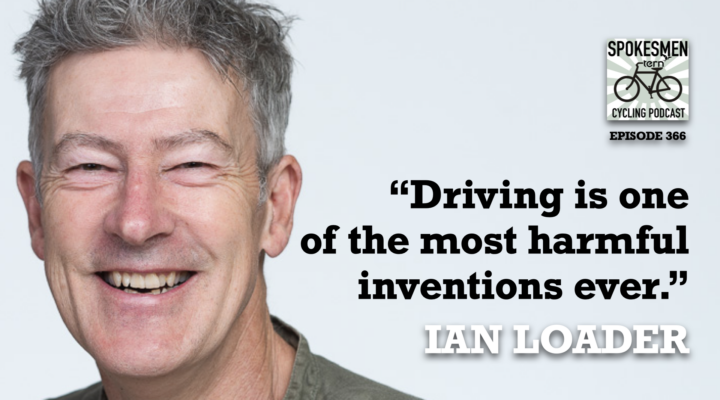
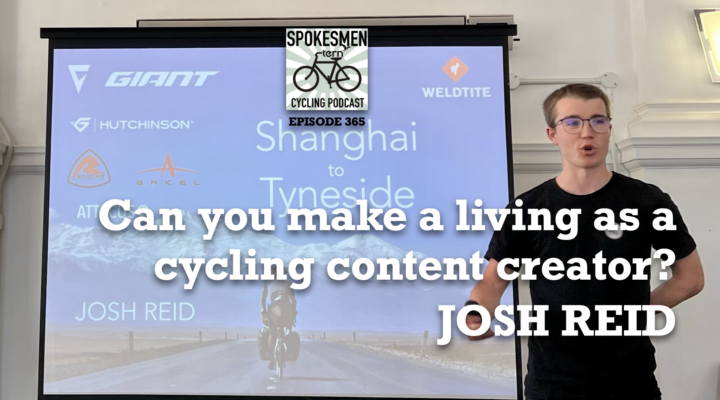
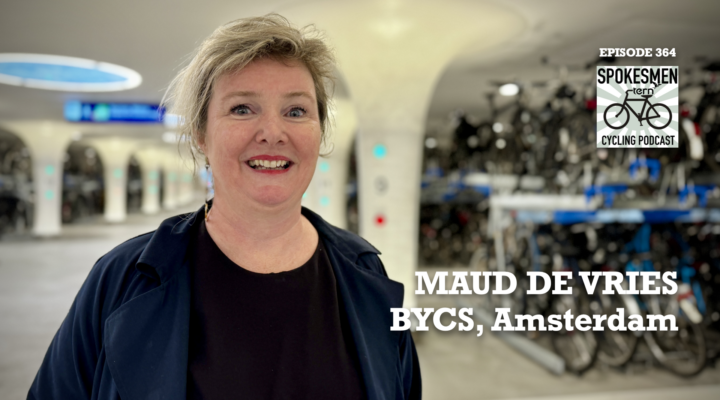
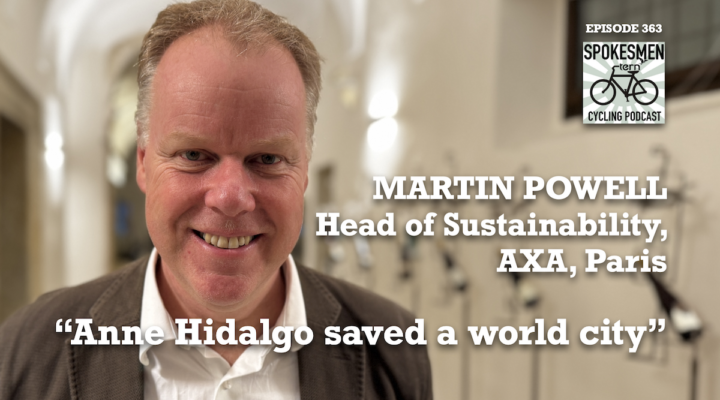
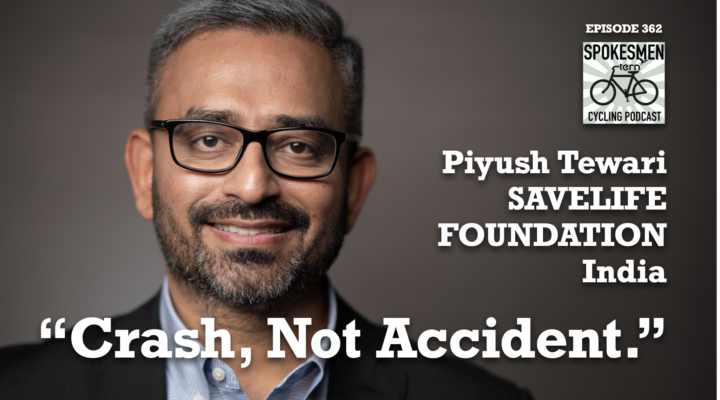
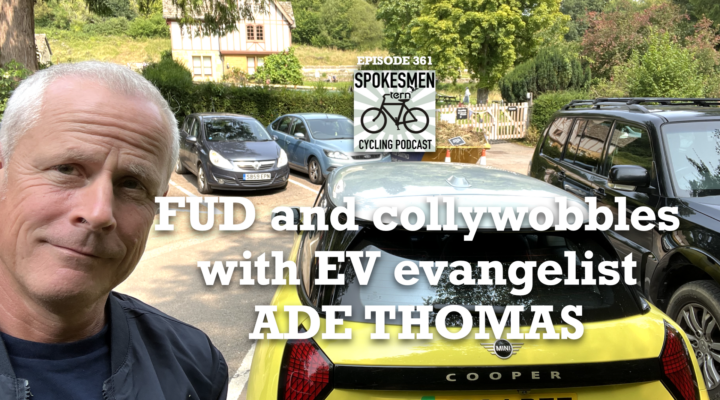
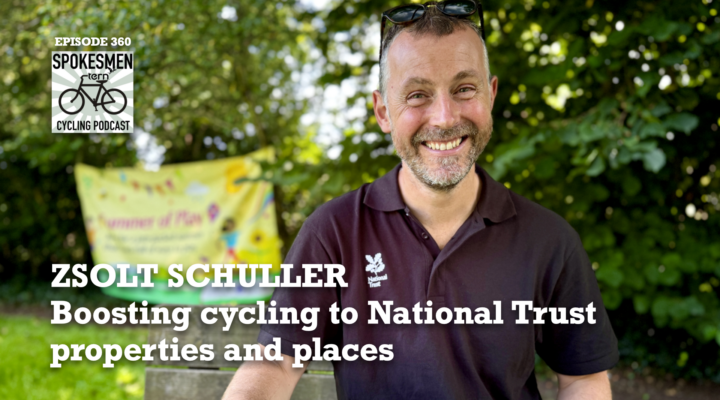
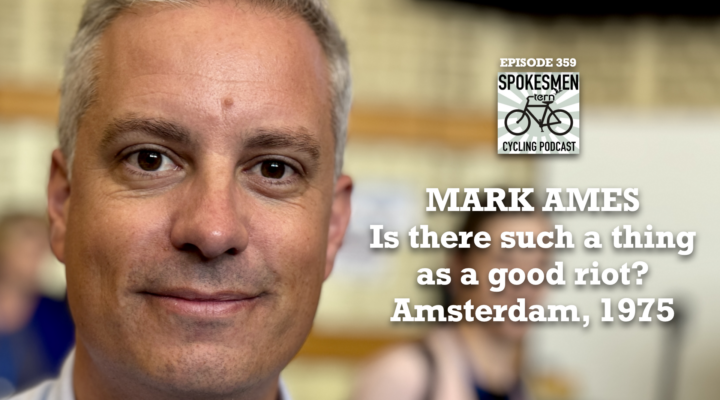
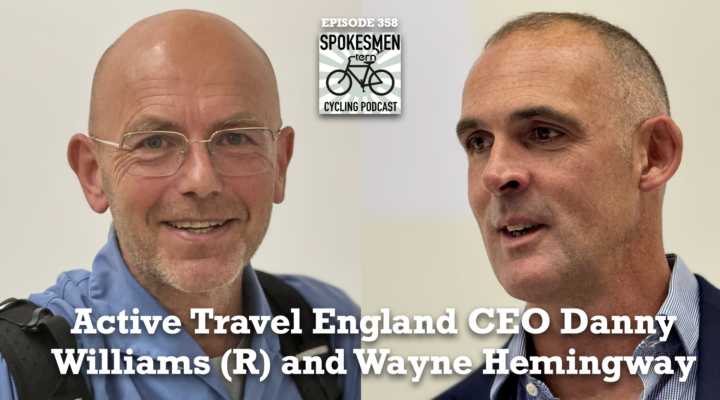
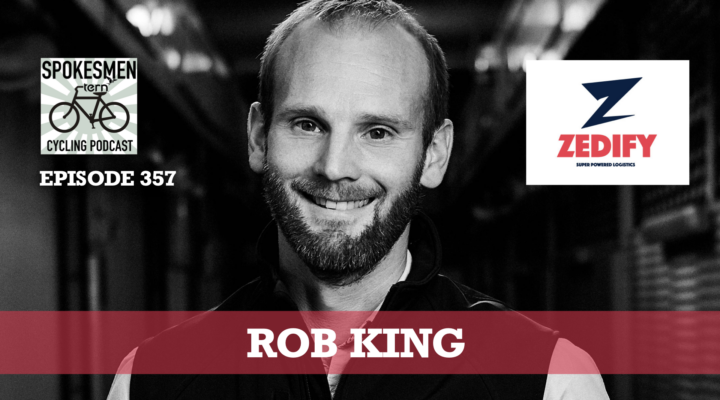
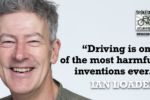
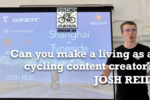

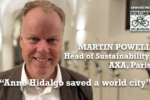
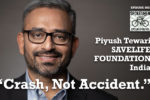
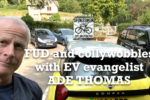

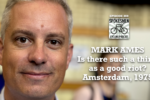
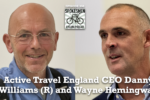
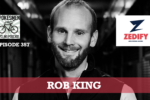
Be First to Comment